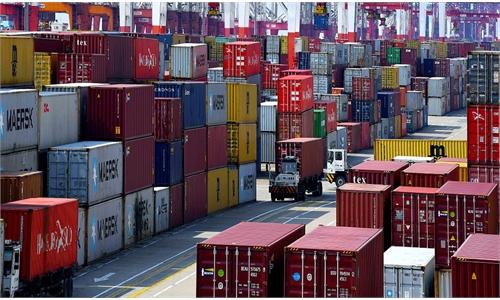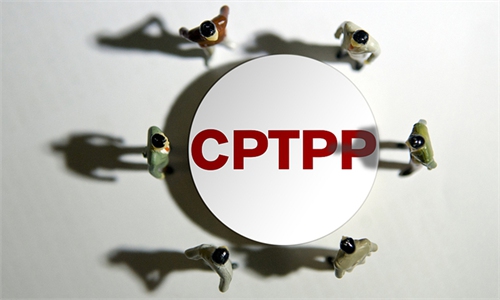
Illustration:Tang Tengfei/GT
During an industry event, Australian Trade Minister Dan Tehan claimed that China's chances of joining the Comprehensive and Progressive Agreement for Trans-Pacific Partnership (CPTPP) could be hurt if it is unable to engage with Australia "on a ministerial level," the South China Morning Post reported on Tuesday.It is not uncommon to see Australian trade officials complain that China doesn't give them a chance to talk. In fact, they have been trying numerous tactics, including making wild accusations against China and using multilateral platforms to pressure China, in hope for trade talks with China. However, what they cannot see is that it is Canberra's extreme and hostile words and deeds toward China that has actually disrupted bilateral engagement.
Ever since China formally applied to join the CPTPP in September, it is not the first time for the Australian trade minister to link China's application to the trade disputes between the two countries. The bottom line is that if Canberra thinks it can use its CPTPP membership as a bargaining chip to pressure China into making concessions, it will be in for a big disappointment.
The downward spiral of China-Australia economic and trade relations is rooted in Australia's extreme hostility to China on multiple fronts that has pushed bilateral ties to a multi-decade low. If anything, current tensions are inextricably linked to Australia's intention of using reckless provocations and malicious attacks against China to show its twisted loyalty and commitment to Washington.
Such ridiculous provocations have recently reached its climax in the context of the conflict between Russia and Ukraine. Australian Prime Minister Scott Morrison recently threatened to impose sanctions against China over the Ukraine situation, pathetically parroting similar threats made by US officials against China. Evidently, such threats made by US officials or anyone for that matter have not and will not work on China.
The current predicament for Australia's massively beneficial trade relationship with China, its biggest trading partner, could have been avoided, if Australia dropped its irrational provocations against China. But Canberra has always been blind to its own mistakes.
Moreover, instead of correcting its own mistakes, Australia has been labeling China's normal trade practices as "economic coercion," while ignoring the fact that it is Australia that actually banned Chinese investments, cracked down on Chinese companies and tore up business agreements with China. Australia was the first country to ban Chinese tech company Huawei's 5G. The number of its anti-dumping and anti-subsidy investigations against Chinese products far exceeds that of Chinese trade remedy measures against Australian goods.
What's more ridiculous is that even as they have singlehandedly undermined bilateral ties, Australian officials would take every opportunity to show their "efforts" to pursue trade talks with China. Whether that's a tactic to fool hurting Australian businesses or fool China about Australia's misdeeds is not the point. The point is that if the Australian government doesn't change its bias and hostility toward China, any dialogue would be futile.
As for China's application to the CPTPP, it should be noted that China's membership is beneficial for all members. Currently, the 11-member CPTPP covers about 500 million people and accounts for about 13 percent of the global economy. If China joins the bloc, it would cover a huge market of nearly 2 billion people and account for nearly 30 percent of the world economy. So if the CPTPP is to grow further into a free trade organization of global significance, then China's massive consumer market and its position in the global industrial chain will be of great significance.
In this sense, Australia's attempt to use its CPTPP membership to pressure China only reflects its profound short-sightedness and selfishness that could hurt all CPTPP members and the bloc's future development.


